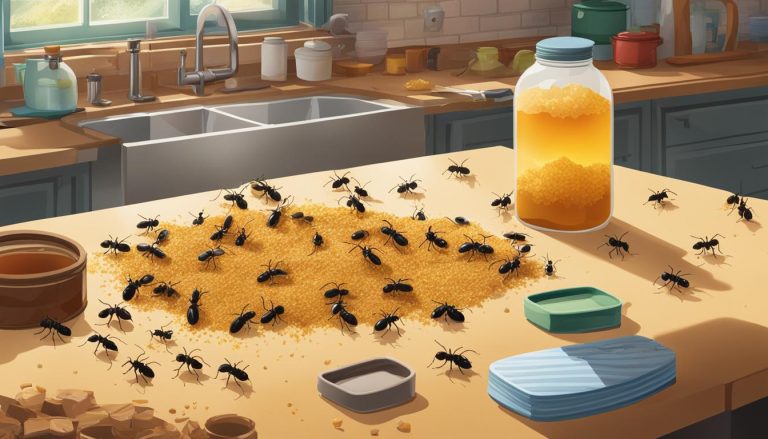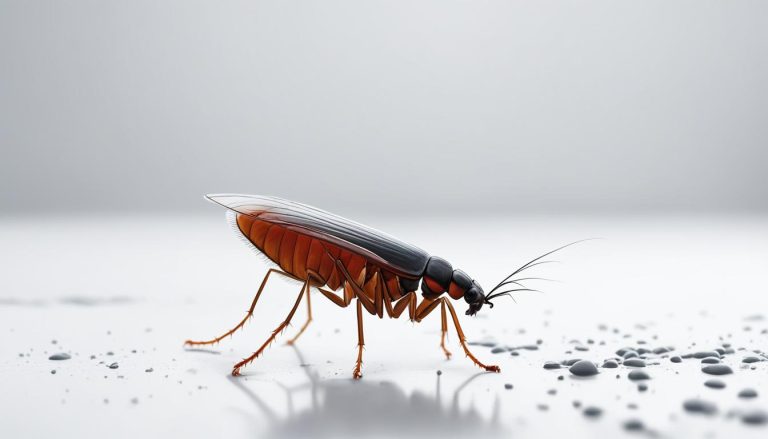G’day plant lovers! Are you looking to keep your Australian gardens free from ants without harming the environment or your lovely plants? Look no further! We’ve got some top-notch tips for ant control for plants that are safe and sound for both your green mates and Mother Earth. Keeping it nice and simple, we’ll show you how to maintain ant-free plants using eco-friendly strategies. No worries about harsh chemicals here; we’re all about safe ant control in this guide!
Key Takeaways
- Use natural methods, like essential oils, to disrupt ant trails.
- Mask scent trails with vinegar or lemon juice to keep ants away.
- Non-toxic agents such as boric acid and diatomaceous earth can knock out ant colonies.
- Grow ant-repellent plants for a beautiful and organic deterrent.
- Simple, eco-friendly tips help you keep your garden ant-free without damage.
Natural Ant Repellents: Safe for Your Plants and the Planet
Are you tired of ants invading your beloved garden? Natural ant repellent methods aren’t just safe for your plants; they’re brilliant for our environment too. Implementing non-toxic ant control can keep your green space serene and ant-free. Here’s a roundup of organic ant control for plants that any plant lover can use:
First, consider the power of herbs. Many aroma-rich herbs not only add zest to your dishes but also double as ant deterrents:
- Rosemary
- Lavender
- Catnip
- Peppermint
- Mint
- Thyme
- Tansy
The mighty garlic isn’t just for spicing up a meal; it’s a strong defender against ant invasions too. But, when you’re in a pinch and need a quick fix to keep ants at bay, your kitchen pantry is bursting with simple solutions:
- Cinnamon
- Lemon Juice
- Vinegar
- Black or Cayenne Pepper
Spreading these ingredients near your plants can disrupt the pesky scent trails that ants rely on. Without their trails, ants are less likely to overrun your plants. This table showcases some everyday items you can use for ant control tips for plant lovers:
| Item | How to Use | Ant Repellent Benefit |
|---|---|---|
| Cinnamon | Sprinkle around plants | Disrupts ant scent trails |
| Lemon Juice | Spray diluted solution | Masks ant scent trails |
| Vinegar | Spray or pour diluted along ant paths | Confuses ant navigation |
| Black or Cayenne Pepper | Sprinkle powder form around garden | Deters ants with its spicy scent |
With these tips, you can create a beautiful, flourishing garden that’s both pleasing to the eye and ant-resistant. Remember, a gentle approach to ant control not only saves your plants but also contributes to the well-being of our planet.

Effective Ant Control for Garden Plants
Ants can be a nuisance, particularly when they take over your beloved garden. Preventing ants on plants is crucial for maintaining a healthy and vibrant garden. Fortunately, there are several tactics you can employ to guard your green space against an ant infestation on plants. Let’s explore some efficient methods to keep your floral friends safe and your garden serene.

Essential Oils: A Scented Barrier Against Ants
Turning to nature’s own defence mechanisms, certain essential oils can do wonders in preventing ants on plants. Here are a few oils known for their ant-repelling properties:
- Peppermint Oil: Its potent scent wards off ants.
- Tea Tree Oil: Contains compounds that ants dislike.
- Lemon Eucalyptus Oil: Offers a zesty aroma that ants avoid.
Dilute these oils with water and spray around the base of your plants for a fragrant and effective ant barrier.
Vinegar and Lemon Juice: Acidic Ant Adversaries
When it comes to effective ant control for garden plants, don’t overlook your pantry. A simple mixture of vinegar or lemon juice with water can interrupt ants’ scent trails, a method they rely on to navigate.
- Vinegar Solution: Mix equal parts water and vinegar and apply where ants roam.
- Lemon Juice Mix: Blend lemon juice with water for a natural ant repellent.
Regular application can help keep ants at bay and your plants safe.
Boric Acid and Diatomaceous Earth: Effective and Eco-Friendly Insecticides
For ant infestation on plants, boric acid and diatomaceous earth offer a potent solution:
- Boric Acid: Works as a stomach poison for ants when ingested.
- Diatomaceous Earth: Dehydrates ants upon contact, leading to extermination.
Being non-toxic, they’re safe to use around plants and offer long-term relief from ant invasions.
Pest-Resistant Plants: The Natural Garden Guardians
Introducing pest-resistant plants into your garden is not just about aesthetics. These plants serve as a natural protective barrier, often deterring ants and other invaders:
- Peppermint: An aromatic natural deterrent.
- Lavender: Its fragrance is known to repel ants.
- Rosemary and Catnip: Not only useful in the kitchen but also as insect repellents.
With these guardians, your garden will be a peaceful haven, free from unwanted pests.
Conclusion
When it comes to how to get rid of ants on plants, eco-friendly ant control methods for plants are not only gentle on the environment but also effective in keeping your Aussie garden blooming beautifully. Embracing solutions like essential oils, as well as kitchen staples such as vinegar and lemon juice, means you’re providing natural barriers against the unwanted critters while also looking after the health of your plants and yourself. These options are terrific for anyone who prefers to steer clear of harsh chemicals in their garden.
Moreover, integrating ant-repellent plants into your floral collection serves as a proactive defense strategy. By creating an inhospitable environment for ants, you’re taking a solid step forward in maintaining an ant-free oasis. This fusion of natural pest control practices aligns perfectly with a love for the environment and an appreciation for organic gardening principles.
Should these ant control measures fall short, don’t hesitate to call in the professionals. They can provide that extra strength needed to clear up persistent ant problems, ensuring your plant pals and peaceful garden vibes remain intact. For a happy and healthy garden, Australian plant enthusiasts know that natural and mindful methods are the key to success.
FAQ
What are some eco-friendly strategies for controlling ants in Australian gardens?
Australian gardeners can use a variety of eco-friendly strategies such as utilizing essential oils like peppermint and tea tree oil to create a scented barrier, applying acidic solutions like vinegar or lemon juice to disrupt ant scent trails, and integrating pest-resistant plants such as lavender and rosemary to naturally deter ants while adding beauty to the garden.
How can I make my garden less attractive to ants naturally?
To naturally dissuade ants from your garden, consider planting ant-repellent herbs like rosemary, lavender, catnip, and mint. Additionally, using common kitchen ingredients such as cinnamon, vinegar, and lemon juice around plants can help break the scent trails and make your garden less inviting to these pests.
What are some effective natural ant repellents that are also safe for my plants?
Safe and effective natural ant repellents include essential oils like peppermint, lemon eucalyptus, and tea tree oil, when diluted with water and applied around the plants. Moreover, non-toxic substances like boric acid and diatomaceous earth are potent against ants and are harmless when used according to directions around your plants.
Can I use vinegar and lemon juice to prevent ants on my plants?
Yes, vinegar and lemon juice are excellent natural ant deterrents. Their high acidity can mask ants’ scent trails, which they use to navigate. Dilute these liquids with water and apply to the affected areas to protect your plants from ant trails. However, be careful to avoid direct application on the plants as the acidity might harm them.
What non-toxic insecticides are recommended for controlling an ant infestation on plants?
Non-toxic insecticides suitable for controlling an ant infestation include boric acid, which acts as a stomach poison for ants, and diatomaceous earth, which dehydrates the insects upon contact. These products are effective when used properly and pose minimal risk to the environment and other non-target species.
Are there any plants that can help protect my garden from ants?
Yes, certain plants can act as natural guardians against ants in your garden. Integrating pest-resistant plants like peppermint, lavender, rosemary, catnip, and thyme can create a living barrier that repels ants while enhancing the aesthetic appeal of your space.
What should I do if natural methods don’t eliminate the ant problem in my garden?
If the ant infestation persists despite using natural methods, it may be time to seek professional help. An expert can assess the situation and provide more powerful solutions or treatments to fully tackle the ant problem while still being mindful of plant safety and environmental impact.






